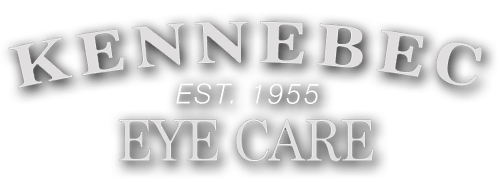Personalized Eye Care
for Your Needs
History of
Kennebec Eye Care Beginning in 1955
In 1955, Dr. Robert Moody opened Kennebec Eye Care in Waterville, ME. Through the years, the practice was owned by Richard Houghton and Frank Myska. In 2017, Dr. Peter Paradis became the owner of Kennebec Eye Care, and he and his capable staff have strived to provide the best in eye care by offering a wide variety of services.
Professional optometrists
Licensed for Patient Care
Our four optometrists come from a variety of backgrounds and are all highly qualified, each holding an advanced therapeutic state license. This license allows them to treat external ocular diseases as well as internal diseases such as glaucoma, dry eyes, diabetes, and macular degeneration. Each optometrist has different availability, so call today to schedule your appointment with the best doctors eye care has to offer.
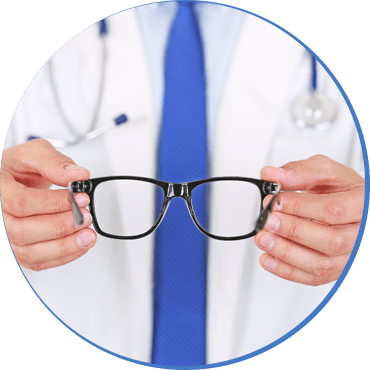

Dr. Peter Paradis, O.D.
Dr. Paradis graduated from the University of Maine at Farmington and earned his optometry degree from The New England College of Optometry in 1998. He joined Kennebec Eye Care in 2009, and took ownership of the practice in 2017.
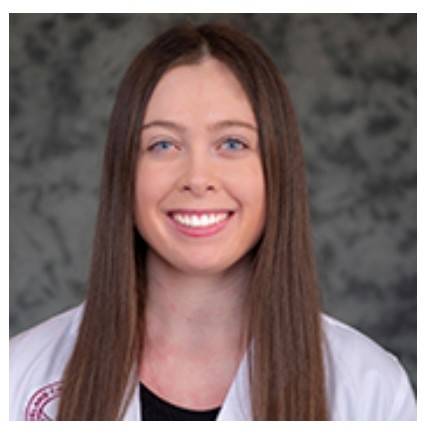
Dr. Kaylee Brann, O.D.
Dr. Brann graduated from the University of Maine at Orono, and earned her degree in optometry at The New England College of Optometry in 2024. She joined Kennebec Eye Care in 2024.
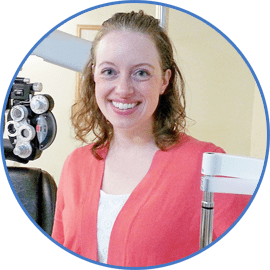
Dr. Lesley Sobeck, O.D.
Dr. Sobeck graduated from Ferris State University , and earned her degree in optometry in 2008 at The Michigan College of Optometry. She joined Kennebec Eye Care in 2017.
Dr. Laura Dowd, O.D.
Dr. Laura Dowd, O.D. graduated from the University of Maine and earned her degree from the New England College of Optometry in 2009. She works at Togus, VA and joined Kennebec Eye Care in 2018.
Meet The Staff
at Kennebec Eye Care
Our doctors are not the only ones who care for our patients every day. Meet our highly skilled optometric and optical staff!
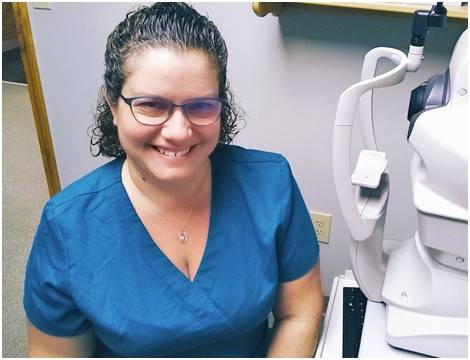
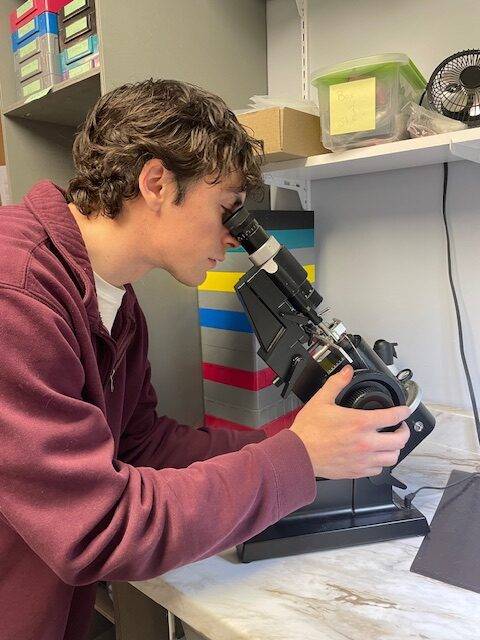
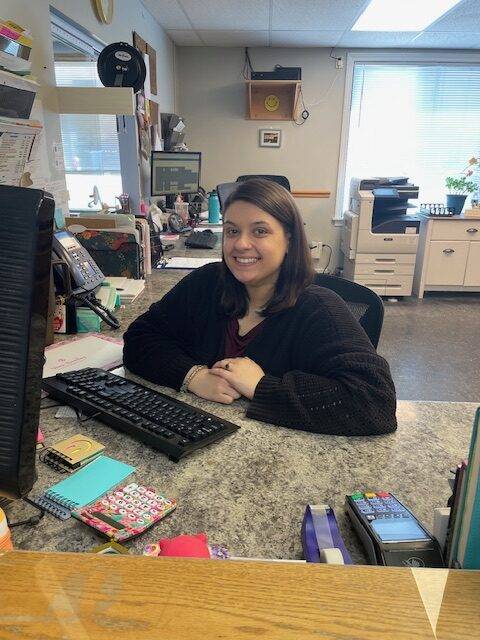
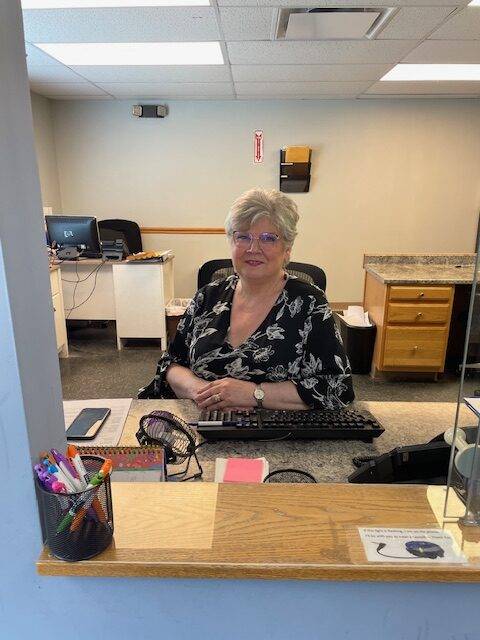
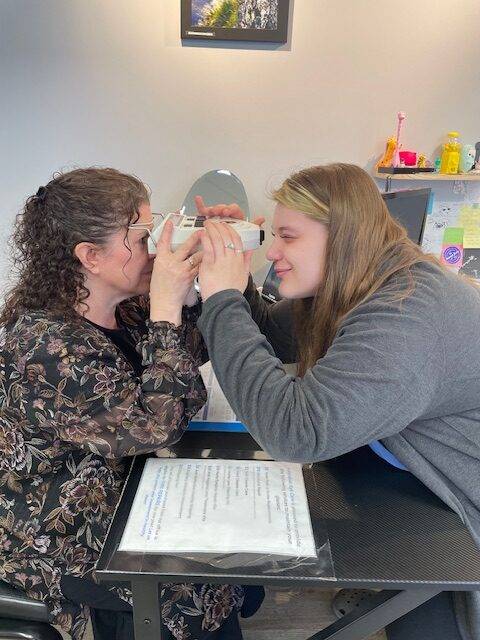
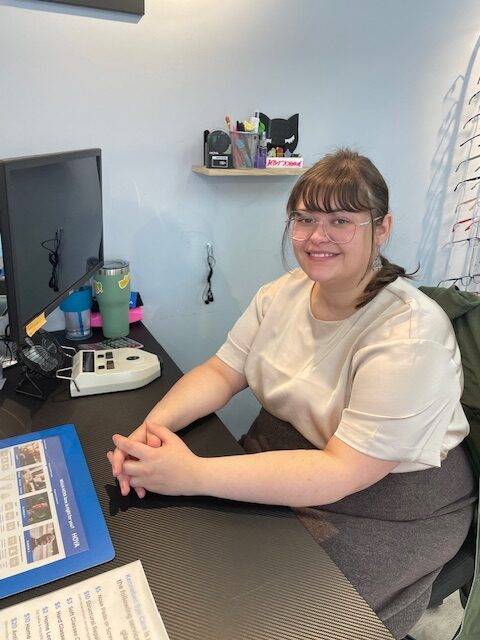

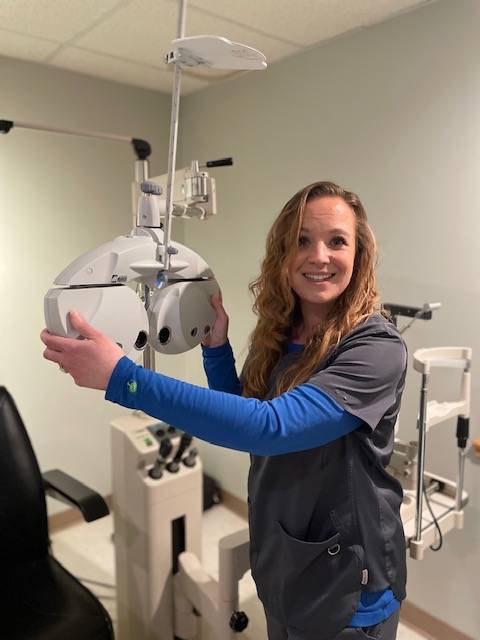
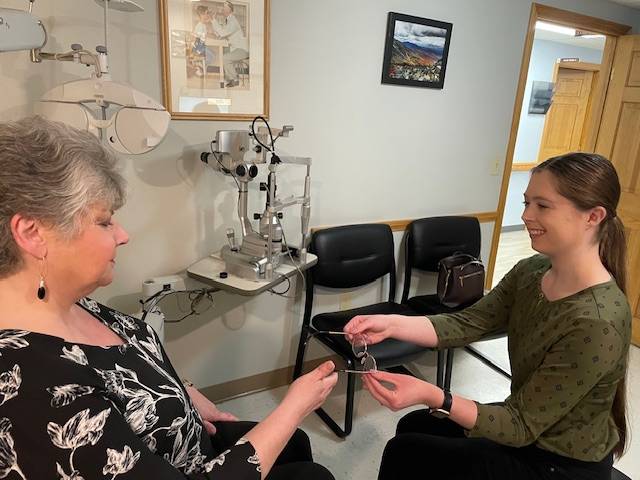
Managers:
Carrie P. – Office Manager
Lexi E – Assistant Office Manager
Danielle D. – Optical Manager
Staff:
Melissa G. – Technician, Optician, Front Desk, Contact Lenses
Darcy L. – Technician
Misty K. – Billing
Kambra W. – Technician
Brett G. – Optician
Lily H. – Optician
Madi T. – Optician
Tabatha C. – Technician
Laurie H. – Front Desk
Brittany H. – Lab Technician
Megan D. – Technician
- How can I best care for my glasses?
- What is a Transitions lens?
- What is a progressive lens?
- Why do I have to pay extra for a contact lenses exam?
- Do I need a prescription to purchase contacts?
- What happens at a contact lens fitting?
- Why should I remove my contacts nightly?
- What should I bring to my eye exam?
- Can I use my flex-spending or health savings card to pay for my visit, my glasses, or my contacts?
- What is the difference between an Ophthalmologist and an Optometrist?
- What is Optomap?
- At what age should I bring my child in for an eye exam?
- What is the difference between nearsighted and farsighted?
- What is color blindness?
- What does 20/20 vision mean?
- What is the purpose of having my eyes dilated?
- Are there any side effects to pupil dilation?
- What is uveitis?
- What are Cataracts?
- What is Glaucoma?
- What is Macular Degeneration?
- What is Dry Eye?
- What is a Visual Field test?
- What is an OCT?
How can I best care for my glasses?
When cleaning your glasses, make sure to use a microfiber cloth. Avoid using the corner of your shirt, napkins, paper towels, or tissues, as these can damage your lenses and may leave scratches. Rinse lenses under lukewarm water if you do not have access to lens cleaner (specifically designed for this purpose).
What is a Transitions Lens?
A Transitions lens changes from traditional clear to a dark tint protecting you from harmful UV (ultraviolet) rays.
What is a Progressive Lens?
Many know or refer to these lenses as no-line bifocals. You can look up to see clearly in the distance. Look ahead to view your computer in the intermediate zone, and drop your gaze downward to read and do fine work.
Why do I have to pay extra for my contact lens exam?
Fitting a patient with contacts requires the doctor to perform additional procedures and utilize their training and expertise. This takes additional time beyond those of a patient that does not wear contacts. The doctor will check your fitting style and vision to determine that contacts are a good fit for your visual needs.
Do I need a prescription to purchase contacts?
Yes, patients require a prescription to purchase contacts. It is illegal to sell contacts without a valid prescription.
What happens at a contact lens fitting?
You will visit the office for your contact lens instruction, where you will sit with a contact lens technician and be instructed on proper techniques of insertion, removal, and care for your contacts. Your vision and placement of the new lenses will be checked by the doctor.
Why Should I remove my contacts nightly?
When you are sleeping with your contacts, you are depriving your corneas of oxygen. Because your eyes are not able to lubricate themselves properly, you risk possibility of infection.
What should I bring to my eye exam?
- Your insurance cards, both medical and vision, even if you think we already have them on file. Failure to bring them could result in a rescheduling of your appointment.
- A form of payment, even if you believe your insurance will cover fully. We accept cash, card, check, and flex-spending cards.
- A list of medications, vitamins, and supplements that you are taking.
- The contact information of your current primary care provider.
>> Back to Top
Can I use my flex-spending or health savings card to pay for my visit, my glasses, or my contacts?
Yes, your flex-spending or health savings card can be used to pay for any of these things. Please make sure that you know the balance on your card before you pay to avoid exceeding your benefits. Some restrictions may apply. Check with your Human Resource Department for clarification.
What is the difference between an ophthalmologist and an optometrist?
An Ophthalmologist (MD) has a medical degree and is licensed to perform eye surgery. An Optometrist (OD) has a degree in optometry and is qualified to screen for eye conditions along with determining the need for glasses and/or contacts.
What is Optomap?
Optomap, an ultra-widefield retinal examination, is the revolutionary diagnostic tool that allows doctors to view a majority of the retina. It is a non-dilating camera that captures a digital image of the retina. It takes just a few minutes to perform, and is immediately available for review with the patient in the exam room.
At what age should I bring my child in for an eye exam?
We recommend as early as 6 months but we recommend that every child comes in for an exam before starting kindergarten.
What is the difference between nearsighted and farsighted?
Nearsightedness (Myopia), causes images in the distance to appear blurry.
Farsightedness (Hyperopia), causes images near to you to appear blurry.
What is color blindness?
Color blindness is the inability to distinguish between certain colors.
What does 20/20 vision mean?
20/20 vision is the standard quality of vision that healthy eyes should be able to attain. The first number represents the distance (in feet) that the patient is standing away from the eye chart. The second number represents a calibrated size of image that the patient is attempting to read. A 20/40 letter is twice the size of a 20/20 letter on the chart, etc.
What is the purpose of having my eyes dilated?
Dilation gives the doctor the ability to view your eye at a wider angle and with a three-dimensional view.
Are there any side effects to pupil dilation?
Dilation is a safe procedure that has very few side effects, other than temporarily blurry vision and sensitivity to light for a few hours.
What is uveitis?
Uveitis is inflammation of the middle layer of the eye. This often causes light sensitivity and blurred or decreased vision.
What are cataracts?
A cataract is a hazy cloudiness of the natural lens of the eye that makes vision unclear and blurry.
What is glaucoma?
Glaucoma is a disease that damages the eye’s optic nerve. It usually happens when fluid builds up in the front part of the eye. The extra fluid increases the pressure in the eye, damaging the optic nerve.
What is macular degeneration?
Macular degeneration, also known as age-related macular degeneration, is a medical condition which may result in blurred or no vision in the center of the visual field. Early on there are often no symptoms. Over time, however, some people experience a gradual worsening of vision that may affect one or both eyes. While it does not result in complete blindness, loss of central vision can make it hard to recognize faces, drive, read, or perform other daily activities.
What is dry eye?
Dry eye is the change in the quality and/or quantity of your eyes’ natural tears.
What is a visual field test?
Visual field tests are used to detect defects or blind spots within your central and peripheral vision.
What is an OCT?
An OCT is a high-resolution picture of the back layers of your eye using light waves.
Kennebec Eye Care Personalized Care in Kennebec County, Maine, Serving:
Waterville, Maine
Augusta, Maine
Fairfield, Maine
Clinton, Maine
Unity, Maine
Albion, Maine
Oakland, Maine
Skowhegan, Maine
Jackman, Maine
Benton, Maine
Winslow, Maine
Sidney, Maine
Belgrade, Maine
Vassalboro, Maine
China, Maine
